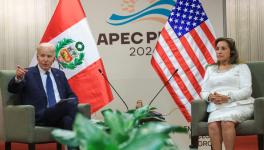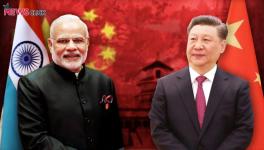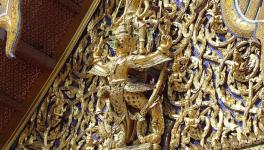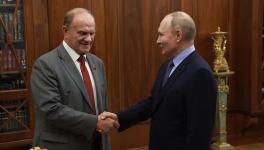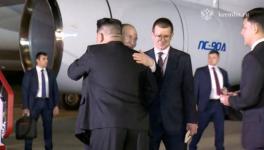Brain-Dead Diplomats: Why Did 51 American State Dept. Officials 'Dissent' Against Obama and Call for Bombing Syria?
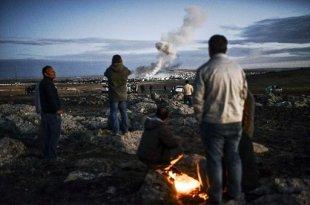
Syrian Trouble
A troubling internal cable signed by a host of U.S. diplomats blames Obama for not striking Syria earlier.
Close to half a million people are dead in Syria, as the country falls further and further into oblivion. Data on the suffering of the Syrians is bewildering, but most startling is that the Syrian life expectancy has declined by over 15 years since the civil war started. On the one side, ISIS holds territory, while on the other a fratricidal war pits the Assad government against a motley crew of rebels that run from small pockets of socialists to large swathes of Al Qaeda-backed extremists. No easy exit to this situation seems possible. Trust is in short supply. The peace process is weak. Brutality is the mood.
Kurdish people observe smoke rising from the Syrian town of Kobane, also known as Ain al-Arab, following an explosion as seen from the southeastern Turkish village of Mursitpinar in the Sanliurfa province on October 20, 2014
What should America do? In the eyes of 51 U.S. diplomats who still haven’t grasped the negative outcomes of the disastrous wars launched since 2002, the solution is to bomb the world into America's image. In an internal dissent cable addressed to Barack Obama, seasoned diplomats have urged airstrikes on the government of Bashar al-Assad in Syria.
Chas Freeman, former U.S. ambassador to Saudi Arabia during the first Gulf War, told me he found the cable “unusual” in two respects. First, it garnered a large number of signatures. Most of those who signed the cable, a State Department official told me, were “rank and file” diplomats, such as a deputy to U.S. Ambassador to Syria Robert Ford and a secretary in the Near East Bureau. They had a good understanding of the current situation in the region. The second reason this cable is unusual, said Ambassador Freeman, is that the signatories “are arguing for rather than against the use of force.” Over the past 40 years, diplomats have used the “dissent channel” to caution against a rush to war. Now these diplomats are asking for an intensification of war.
Push Obama, Elevate Clinton
Why did the diplomats write their dissent now, and why was it leaked to the press? A former ambassador, with deep experience in the Middle East, told me it was an error to leak the cable.
“Someone decided to leak it,” he said, “for whatever irrational reason, an action as blatantly incorrect as it is most certainly politically and diplomatically counterproductive.”
Why is it counterproductive? The cable will not produce the outcome desired by the diplomats. But even so, it serves to bring U.S. politics into the domain of diplomatic procedures.
Do the diplomats expect that President Obama would read their cable and rush to a bombing raid, which he has resisted? No one assumes that Obama would hastily send in the jets to bomb Damascus. He has been cautious because he seems to recognize that the outcomes of such interventions could be worse than the reasons for them. It is now well established that in 2011 Obama was loath to enter the Libyan conflict. It was the French who were most eager, and it was Secretary of State Hillary Clinton who carried the French message to Obama. She and U.S Ambassador to the UN Samantha Power convinced Obama to endorse the NATO move into Libya. There is little indication that Obama wants to expand the chaos in Syria by bombing the Syrian Arab Army and the institutions of state in Damascus.
A former ambassador told me that many of the diplomats have great fealty to Hillary Clinton. Could they have leaked this cable to boost Clinton’s narrative that she wanted a more robust attack on Damascus as early as 2012? Is this a campaign advertisement for Clinton, and a preparation for her likely Middle East policy when she takes power in 2017? Clinton certainly advocated tougher military action in Syria. She joined CIA chief David Petraeus to push for a U.S.-backed rebel army in 2012, and she argued for air strikes when there was no appetite for this in the White House. Last year, Clinton called for the creation of a no-fly zone, a seemingly innocuous term that would have provided the pretext for Syria to hit either U.S. or Turkish aircraft and then escalate the conflict into full-scale war. If anyone carries the torch for these diplomats, it is Hillary Clinton. Her sensibility toward regime change seems shared by these people. War, for them, is not the breakdown of diplomacy; it is an instrument of diplomacy.
Multi-polarity
Ambassador Freeman says that the diplomats, in their cable, “embrace the use of force without linking it to any diplomatic strategy and accept the oft-disproven assumption that regime change will produce peace rather than additional political complexity or anarchy.” This is the most curious part of the cable, which does not have a detailed assessment of what would come after Assad.
Where are the Syrian liberals, the preferred instrument of American regime change? They are not in the picture. The Muslim Brotherhood and the Saudi-backed proxies dominate the Syrian opposition leadership in Istanbul. Qatar, Saudi Arabia and Turkey back them to the hilt. They are not amenable to the niceties of American liberalism. The most ferocious rebel fighters in Syria are under the ambit of Al Qaeda and its many offshoots. The U.S.-backed rebels are weak, while the Kurdish-backed Syrian Democratic Forces has less commitment to the United States than to its own Kurdish ambitions. To believe that the small bands of fighters from towns like Kafranbel would be able to control the dynamic after U.S. jets strike Damascus is naive. The beneficiary of such strikes would most likely be the most bilious of the forces in the rebel camp.
What is most astounding about the cable is that it mistakes objective shifts in geopolitical relations for subjective errors. This is an elementary error for observers of international relations. The cable blames Obama for not striking Syria earlier and asks that he do so now. But Obama did not strike Syria in 2013 because he recognized, correctly, that the Russians, Chinese and most of the major countries of the Global South (including India) deeply opposed regime change. It was to finally stop any consideration of regime change that the Russians directly intervened in 2015. The deployment of Russian S-400 surface-to-air missiles would put any U.S. bombing raid into direct confrontation with the Russians. This is a very dangerous situation. Older habits of U.S. uni-polarity, developed from Gulf War 1 in 1990, no longer apply to an increasingly multi-polar world. It is not Obama’s timidity that led to the failure of aerial bombardment in Syria, as the diplomats contend, but it has been the rising confidence of certain world powers to confront U.S. preponderance. That this is not evident to the diplomats suggests they have a poor understanding of the world.
Ambassador Freeman suggests that the diplomats are making a “moral case,” which would mean that they are simply washing their own hands off of the disaster in Syria. They perhaps want to say, we are not responsible for the destruction of Syria, and if you had bombed Syria earlier, the situation would not be so dire. Since the diplomats “put forward no argument for why their approach would yield a particular outcome,” says Freeman, it is hard to take them seriously. There is nothing wrong with a cry from the heart, but it is dangerous to make policy based entirely on frustration and anger.
Dissent Channel
The most important internal criticism of U.S. policy came in 1971 from Dhaka, when the U.S. Consul General Archer Blood sent a telegram to Washington critical of U.S. backing of Pakistan over its massacres in (what was then) East Pakistan. “Our government has evidenced what many will consider moral bankruptcy,” he wrote on behalf of 19 other diplomats in what would later be called the Blood Telegram. It was an indictment of U.S. power. The Blood Telegram suggested that the U.S. backing for Pakistan gave it confidence to continue with its massacres in its eastern province. It called upon the U.S. to put pressure on Pakistan not to act in this way. Secretary of State Kissinger was furious. Blood was recalled to Washington and sidelined. It was more important to cultivate Pakistan as the doorway to China, which is indeed what happened in 1972. Those who died in East Bengal had to be sacrificed for a large goal—the U.S. rapprochement with China against the Soviet Union.
Blood understood that the U.S. government had leverage over Pakistan. The U.S. 7th Fleet sailed up the Bay of Bengal to put pressure on India, with Soviet backing, not to intervene. (I was a young boy in Calcutta at the time, putting up black paper on our windows, waiting for the U.S. ships to come within range.) India nonetheless intervened and helped to end the massacres. Blood had been correct, as he wistfully told me on the telephone from his home in Fort Collins, Colorado, a year or so before his death. It was in response to the Blood Telegram that the State Department created the “dissent channel” (not in response to the Vietnam War, as Mark Landler says in the New York Times).
The “dissent channel,” said the former ambassador who worked in the Middle East, should work as “an internal means of presenting ideas and opinions to the leadership.” But this action, with the move to publicity, will not help the aims of U.S. diplomacy. Nor will it help the Syrian people.
Courtesy: alternet.org
Vijay Prashad is professor of international studies at Trinity College in Hartford, Connecticut. He is the author of 18 books, including Arab Spring, Libyan Winter (AK Press, 2012), The Poorer Nations: A Possible History of the Global South (Verso, 2013) and the forthcoming The Death of a Nation and the Future of the Arab Revolution (University of California Press, 2016). His columns appear at AlterNet every Wednesday.
Disclaimer: The views expressed here are the author's personal views, and do not necessarily represent the views of Newsclick
Get the latest reports & analysis with people's perspective on Protests, movements & deep analytical videos, discussions of the current affairs in your Telegram app. Subscribe to NewsClick's Telegram channel & get Real-Time updates on stories, as they get published on our website.









